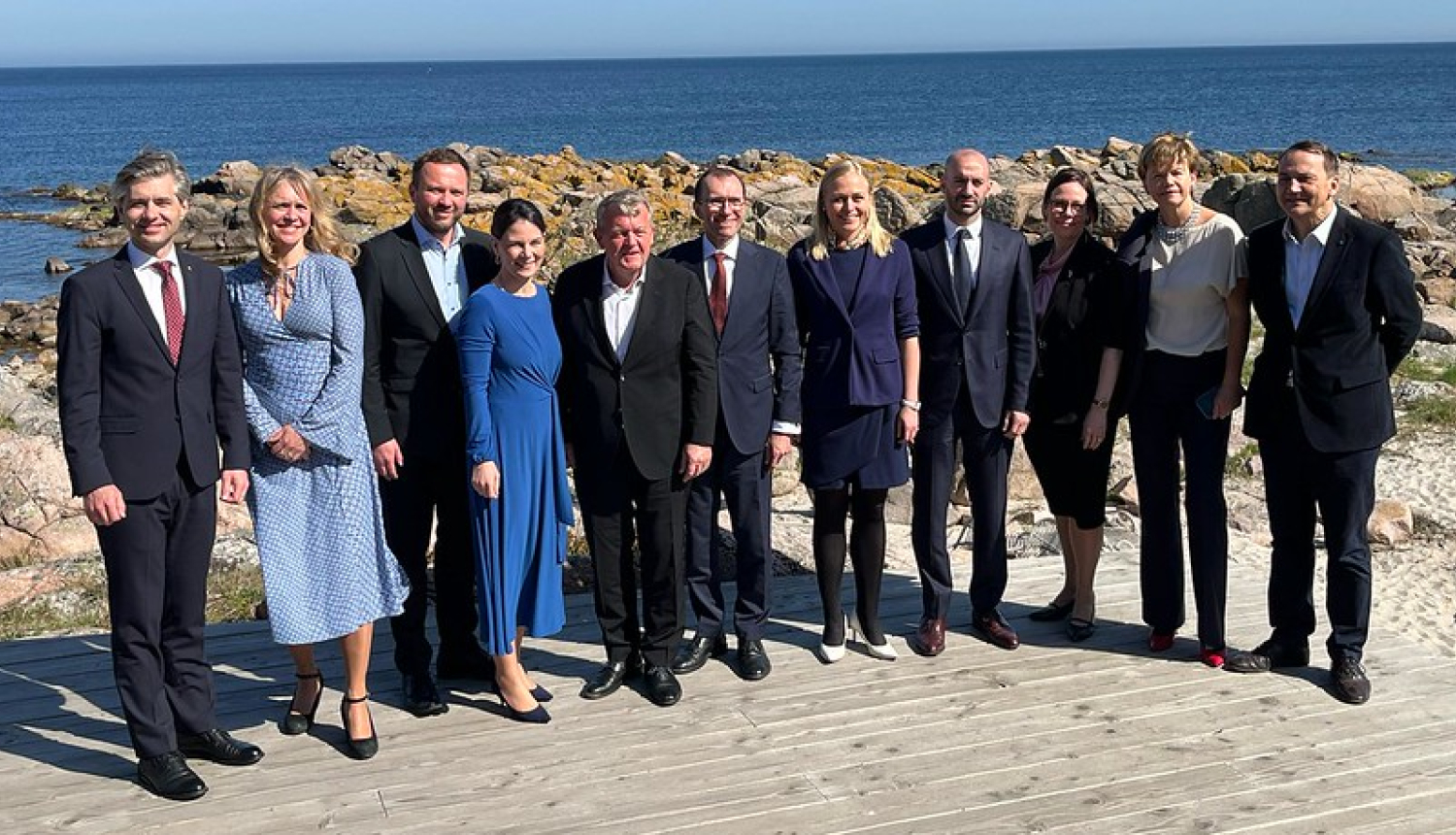Further support to Ukraine, security of the Baltic Sea region, containing Russia, including its “shadow fleet”, transatlantic relations, strengthening the security of Europe and across the Euro-Atlantic space – those were key topics addressed at the annual meeting of the Foreign Ministers of the Baltic states and Nordic countries (NB). For the first time, the meeting was joined by the ministers of the Weimar Triangle countries – Poland, Germany, and France. It was held on 28 and 29 April in Bornholm, Denmark.
The Minister of Foreign Affairs, Baiba Braže:
“The meeting in Bornholm is historic, as it is for the first time that we meet in this format, which is a testament to our common goal – to deepen regional cooperation, strengthen security and resilience in the Baltic Sea region. We are all “in the same boat”, and the decisions we make together will affect the security of all of us.
We are united in our continued support for Ukraine – it is our moral, legal and political duty to support a country that defends itself while at the same time fighting for our security. The Nordic, Baltic and Weimar allies share a common vision: a sovereign, independent and democratic Ukraine, which is an integral part of the Euro-Atlantic and global security. Since the beginning of Russia’s full-scale invasion of Ukraine, we, 11 countries, by having provided more than 100 billion euros in military and other support, have been among the largest supporters of Ukraine. We will continue to render political, economic, military and humanitarian assistance to Ukraine to ensure it is in the strongest possible position on the path to a comprehensive, just and lasting peace that would guarantee Ukraine’s independence, sovereignty and territorial integrity, as well as strengthening European security.
We must strengthen our own security rapidly, and do it sooner – we need to significantly increase our defence spending to achieve NATO’s capability targets and to assume greater responsibility for European and Euro-Atlantic security. We must also continue to deepen cooperation between NATO and the EU.
We are aware that Russia is, and will remain a direct threat to the security of all of us in the foreseeable future. We appreciate the United States’ efforts in the peace process. At present, there is no sign that Russia wants peace: its illegal war of aggression against Ukraine and increasingly intense hybrid threats affect global stability and security. We will step up pressure on Russia through new sanctions, as well as looking ahead to an EU Action Plan to gradually phase out the imports of Russian energy resources – this is an important tool for reducing revenues fuelling Russia’s war economy.
We have also agreed on a more coordinated cooperation to limit the activities of Russia’s “shadow fleet”. Russia must be further weakened so that, in the event of a ceasefire, Russia would not have the capabilities and possibilities of launching a new invasion.”
Joint statement by the Nordic-Baltic-Weimar Ministers of Foreign Affairs
The Ministers were of one mind that Russia’s assets should remain immobilised until Russia ceases its war of aggression against Ukraine and fully compensates it for the damage caused.
The officials expressed their strong support for Ukraine’s Euro-Atlantic integration. They also welcomed the progress made at the London meeting between the E3 (United Kingdom, France and Germany), Ukraine, and the United States. This process must continue. The Ministers also welcomed the efforts of the “Coalition of the Willing”.
The Ministers also exchanged views on the European Commission’s White Paper on European Defence Readiness 2030 and the ReArm Europe Plan as well as the need to increase the technological and industrial capacity of Europe’s defence sector and to address gaps in critical capabilities. This includes strategic partnerships, joint procurement and investments to develop a strong defence industry in Europe.
Further information
- In 2025, cooperation among the NB8 countries in the foreign affairs sector is coordinated by Denmark, who has set the following priorities: cooperation in the strengthening of security and defence; promotion of regional and global support to Ukraine; and enhancing European military industrial and defence capabilities.
- The NB8 (Nordic–Baltic Eight) is an informal cooperation framework comprising Denmark, Iceland, Norway, Finland, Sweden, Latvia, Lithuania and Estonia.
- Read more about NB8 on the Foreign Ministry website: Co-operation among the Baltic and Nordic countries
- The Weimar Triangle is a regional alliance of France, Germany, and Poland created in 1991 on the German to promote Poland’s integration into the EU and NATO.





